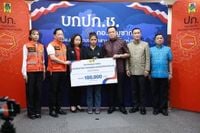The Export-Import Bank of Thailand (EXIM BANK) is stepping up to support Thai entrepreneurs facing challenges from the United States' new reciprocal tariffs. Mr. Bandhit Saweeyarchan, the bank's Managing Director, recently announced a series of measures aimed at mitigating the impact of these tariffs, which are expected to affect many businesses in Thailand.
During a meeting with representatives from the Ministry of Finance, the Ministry of Commerce, and high-ranking officials from both the public and private sectors, Saweeyarchan outlined five key strategies. First, the bank will establish an Export Clinic, designed to assist both importers and exporters who are feeling the pinch of these new tariffs. This initiative will provide financial support, including the option to extend debt repayment periods up to 365 days, liquidity assistance, and reduced interest rates.
Furthermore, the bank aims to enhance communication with entrepreneurs by offering advice and information regarding the reciprocal tariff policy and its implications for their businesses. This support will also include guidance on how to manage operations that may be adversely affected by the tariffs.
Another crucial aspect of EXIM BANK's strategy is to foster collaboration with the Ministry of Commerce and other relevant agencies. The goal is to help small and medium-sized enterprises (SMEs) explore new markets that may offer better opportunities. To this end, the bank is prepared to offer loans for participation in trade shows and export promotions, providing an added layer of security by covering 75% of the value of goods purchased abroad.
EXIM BANK is also committed to facilitating imports from the U.S. without negatively impacting domestic entrepreneurs, aligning with the government’s broader policy objectives. In 2025, Thailand is projected to achieve a total export value of $300.53 billion, with 18% of that amount, or approximately $54.96 billion, destined for the U.S. market.
According to the Office of Small and Medium Enterprises Promotion (OSMEP), around 3,700 Thai SMEs are expected to be impacted by the U.S. tariffs, with an estimated export value of $7.634 billion. As a state financial institution, EXIM BANK is poised to play a pivotal role in supporting these businesses through challenging economic times.
Meanwhile, in a related development, Mr. Anutin Charnvirakul, Thailand's Deputy Prime Minister and Minister of Interior, addressed the aftermath of a devastating earthquake in Myanmar on March 28, 2025. This disaster has reportedly led to significant damage across various regions, particularly in Bangkok, where the toll has reached 49 fatalities, with two identities still being confirmed as of April 18.
To ensure effective disaster relief, the Central Budget Bureau has authorized the Department of Disaster Prevention and Mitigation (DDPM) to act beyond standard financial guidelines to provide immediate assistance to affected individuals. The aid package includes a funeral expense of 100,000 baht for each deceased, 100,000 baht for those who are severely injured or disabled, and coverage for medical expenses that are not reimbursed under standard provisions.
Charnvirakul emphasized the government's commitment to supporting disaster victims, assuring families of the deceased that they will receive the necessary financial assistance promptly. So far, 17 families have successfully applied for and received funeral assistance, with the majority of the deceased being laid to rest in their home provinces.
In addition to funeral expenses, the government is working to expedite the identification of victims and facilitate the transfer of financial aid to their relatives. For instance, the family of Mr. Chatchawan Thongpud, a victim from Phitsanulok, has already received assistance after confirming their documentation.
Charnvirakul also instructed provincial governors to ensure smooth transactions for families receiving aid, highlighting that the government is dedicated to providing comprehensive support to all affected individuals.
In a statement, Mr. Phasakorn Boonyalakshman, DDPM Director, reiterated the importance of swift, accurate, and fair assistance to earthquake victims, adhering to the Ministry of Finance's regulations regarding emergency disaster relief funds. The agency is collaborating with Bangkok authorities and affected provinces to assess damages and compile lists for aid distribution.
For those seeking assistance, proper documentation is essential. Victims are advised to prepare necessary paperwork, including identification cards, household registration, and proof of damage, to ensure the processing of their claims is as smooth as possible. In Bangkok, claims can be submitted at the local district office, while residents in other provinces should contact their local administrative organizations.
As Thailand navigates these dual challenges—supporting its entrepreneurs against international trade pressures while also responding to domestic disaster relief needs—it is clear that both the government and financial institutions like EXIM BANK are committed to fostering resilience and recovery across the nation.





